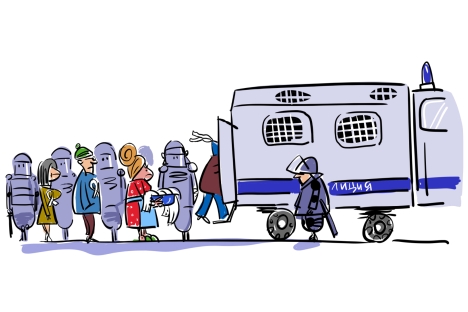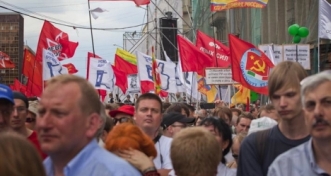One year on, officials and opposition still look for a dialog


Drawing by Alexei Yorsh. Click to enlarge the image.
In the last six weeks, the state’s punitive measures have become visibly stronger, and opposition leaders and protestors have been feeling the pressure.
In late November, the first sentence was handed down in relation to the Bolotnaya Sqaure rally, which took place in Moscow this May. Before that, there were the dancers in the church, with a sentence imposed on them so harsh that even some people in power were shocked. All of a sudden, protest leaders dialed down their social activities, and some ceased altogether.
The wave of “angry citizens” has faded away, leaving an unpleasant ambivalent aftertaste. On the one hand, there is fear. Many would now think twice about the price they are ready to pay for displaying their civil discontent in public. On the other hand, there is disappointment. Many of the debates between the opposition leaders, who tend to make matters personal after the first few remarks and gauge people around them according to their level of dislike for certain others, have actually raised the questions of dignity and respect.
Any wave has the tendency to eventually fade. Unless the people in question are professional revolutionaries, they are unable to keep the fire burning forever — especially when there is no chance of having a full-scale formal discussion.
The most discouraging trend is the disappearance of those who are not so revolution-minded: Those who would have been called the intelligentsia years ago and can currently be rightfully referred to as the cultural elite of the country; those who have earned people’s respect in word and deed. But they have also become less conspicuous lately.
This process may have been caused not only by fear and retaliation by the authorities, but also by the objective course of life: The wave rises and then falls. Everyone has taken a pause to deliberate.
Some experts do not expect a new outburst of social activism until 2014, when mayoral elections are due in Moscow, and when the first moves can be made toward the design of the 2016 parliamentary elections. This is when the first social barometer will emerge to indicate not only the moods of the creative class, but also its new status. It will show whether the discontented will be ready to make a statement — by what means, with what degree of expression and with which leaders.
The response of the authorities will also be indicative, whether they are proactive and retaliatory, or constructive and punitive.
No sooner had the wave of protests faded than the elites redoubled their activities — including those targeted against some of their own members. It started with the bill on banning foreign assets, with calls for the “nationalization” of a “more patriotic” the ruling class. A wave of dismissals followed.
Often, they were so intense that many were astonished, because nothing like it had happened for almost a decade. It took less than two months for the administration to get rid of two ministers (one of them a key figure), regional officials and heads of corporations. Nearly all of them were sacked as a result of financial scandals.
This is not to say that all of these developments form a chain of events; on the contrary, they each have their own logic and different underlying causes. There are clashes between clans and exemplary punishments aimed to “teach others not to do it.” However, this gives the impression that these two processes are somewhat interconnected: The new outbreak of struggle and accumulated insults on the one hand, and changing notions of loyalty on the other.
This is where opinions are divided. Some insist that the disfavor of some officials is the direct result of their losing their sense of moderation. Some believe that “moderation” is a vague concept; if the loyalty of an official raises no questions, then the allowed degree of “moderation” will be substantial.
Therefore, the last straw for decision-makers was not that some of the officials crossed the line. It was something else: For example, the absence of any clear signals from above concerning who can be “moved” and who remains “untouchable.”
The truth traditionally lies somewhere in between. Sensing that the principle of “irremovability” has been weakened, various groups have started a campaign for new lands.
The “no one is untouchable” mantra that officials have been chanting over the last few weeks seems like an attempt to be convinced that the opposite is true. Elites cannot help but understand that they are all very much vulnerable — their prosperity depends entirely on the power of their clan and whether they are still in favor.
What is happening now will either lend integrity to the elites or, on the contrary, encourage them to put their interests above “corporate” solidarity. A lot will depend on what sort of vibrations the strongest, most visionary and shrewd people will sense in the political air.
The opinion is first published in Russian in RIA Novosti.
All rights reserved by Rossiyskaya Gazeta.
Subscribe
to our newsletter!
Get the week's best stories straight to your inbox
